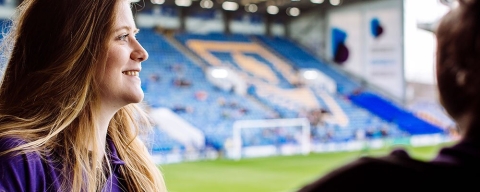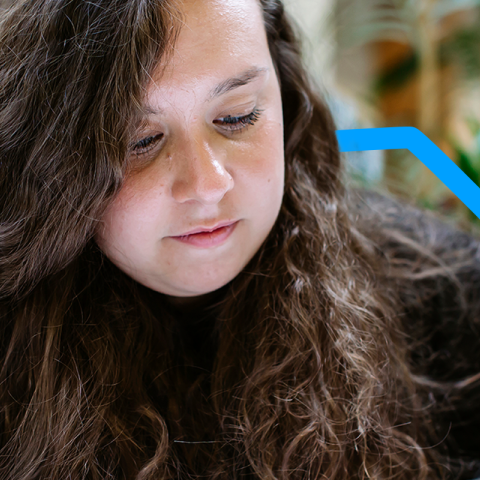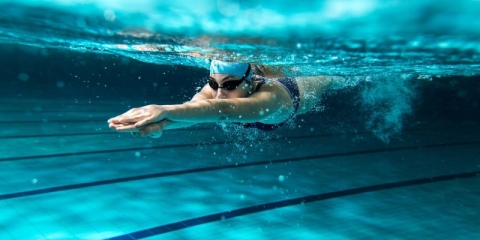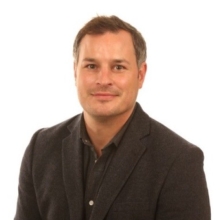
Showing content for section Overview
Overview
If you're a sport science or psychology graduate or an individual seeking a career change within sport and performance systems, our accredited MSc Applied Sport Psychology degree course is an essential step on your journey to becoming a practitioner psychologist.
Psychology plays a huge role in behaviour in sport, exercise, and performance environments by helping – or preventing – people from achieving optimal health and performance.
You’ll benefit from teaching unique to Portsmouth, including the psychology of elite performance and applied sport psychology, develop knowledge and skills that are critical to practitioners, and study key themes in the psychology of exercise and physical activity.
We'll provide the expertise and support you need to develop your professional practice and we’ll give you outstanding preparation and insight into becoming a practitioner psychologist.
When you graduate you'll be prepared for a career in sport and exercise psychology and you might continue your training working with professional sports clubs, national sports organisations and private clinics, perhaps by continuing your training journey on our professional doctorate.
Eligibility
This course accepts UK, EU, and International students.
Course highlights
- This is the first course in the country to offer dual British Association of Sport and Exercise Sciences (BASES) and British Psychological Society (BPS) accreditations.
- Learn from our team of HCPC registered sport and exercise psychologists and BPS chartered psychologists who are experienced in research and applied practice in sport and performance domains.
- Benefit from modules unique to Portsmouth such as the Psychology of Elite Performance and Applied Sport Psychology to get outstanding preparation and insight into becoming a practitioner psychologist
- Study a broad range of course work suitable for careers in healthcare, elite sport, education, professional sports clubs and the military
- Use our psychology laboratory with specialist equipment, including a ASL (Applied Science Laboratories) mobile eye-tracking and PLATO Liquid Crystal Spectacles, to test how quickly performers respond to visual or auditory cues
- Benefit from our links with UK Sport and Portsmouth Football Club.
- Enjoy access to our outstanding new Ravelin Sports Centre, designed to be one of the UK’s most sustainable sports facilities


Accreditations and endorsements
This course is accredited by the British Psychological Society (BPS) and endorsed by the British Association of Sport and Exercise Sciences (BASES)
Number 1 in the UK for student support
Our sport and exercise sciences courses are ranked first in the UK for student support in the 2024 Postgraduate Taught Experience Survey (PTES)
Explore MSc Applied Sport Psychology at Portsmouth
Find out more about our accredited MSc Applied Sport Psychology degree course, including what you'll study and career outcomes.
Note from September 2025 the name of this course is changed from MSc Sport and Exercise Psychology to MSc Applied Sport Psychology.
Chris Wagstaff: This Masters in Sport and Exercise psychology is a fantastic opportunity for you to learn about the theory and the practice of sport and exercise psychology. The course runs over one year, full time or two years part time. On the course you'll study a whole range of modules. We cover applied sport and exercise psychology. We cover performance psychology, and we also study exercise, psychology and physical activity. The course is accredited with both the British Psychological Society and the British Association of Sport and Exercise Scientists, and it's the first course in the country to have those dual accreditations. If you only have a BSc in this area, in psychology or in sport exercise sciences, you can't continue on to practice as a psychologist without these further degrees. But lots of people also use this course to go and work in other sectors, such as in business, in education, in health care. The transferable skills in this course are absolutely fantastic. We really think that our students have a great opportunity in employment and in the workplace, whatever sector they leave and go on to. We think that we offer the best performance psychology insight in the country.
Contact information
Contact AdmissionsEntry requirements
Eligibility
This course accepts UK, EU, and International students.
September 2025 start
- An upper second-class honours degree or equivalent in a Sport and Exercise Science, Psychology, Sports Psychology or related subject. Alternative qualifications will be considered on a case by case basis.
Please get in touch if you're not sure if your undergraduate subject is relevant to this degree.
Equivalent professional experience and/or qualifications will also be considered, such as previous study, employment, voluntary work and training courses, including courses and qualifications you didn't complete. Learn more about our Recognition of Prior Learning (RPL).
If you're applying as an international student with a non-UK degree, you’ll need to show you meet the UK entry requirements listed above.
To find out if your non-UK degree or other qualification is accepted, please visit our page for your country and view the UK equivalent of your qualification.
- English language proficiency at a minimum of IELTS band 6.5 with no component score below 6.0.
You do not need an IELTS or equivalent certification if:
- you have a UK degree
- you have a degree from a majority English speaking country (not taught by Distance Learning)
- you are a national of a majority English speaking country
Degrees taught solely in English from non-majority English speaking countries will be considered on a case by case basis. Find out more about our English language requirements.
If you do not meet the English language requirements yet, you can achieve the level you need by successfully completing a pre-sessional English programme before you start your course.
Course costs and funding
Tuition fees (September 2025 start)
- Full-time: £9,400
- Part-time: £3,130 in year 1 and £6,270 in year 2
(including Transition Scholarship)
- Full-time: £9,400
- Part-time: £3,130 in year 1 and £6,270 in year 2
- Full-time: £17,200
- Part-time: £5,730 in year 1 (60 credits) and £11,470 in year 2 (120 credits)
University of Portsmouth graduates may receive a 20% alumni tuition fee discount.
Fees are subject to annual increase. Read our tuition fees terms and conditions.
You'll be able to pay your fees in instalments. Find out how to pay your tuition fees.
Funding your studies
Explore how to fund your studies, including available scholarships and bursaries.
If you're a UK student, you may be eligible for a Government Postgraduate Master's Loan, which you can use to help with course fees and living costs.

Sport scholarships of up to £3,000 for student athletes
If you're competing at national standard or above in your sport, you may be eligible for funding. Around 20 student-athletes are awarded bursaries between £500 and £3000 per year.
Loans, scholarships and bursaries
Browse funding such as the Government Postgraduate Loan, our scholarships for new and returning students, and subject specific loans.

Funding for international students
Learn more about sponsorships, scholarships and loans for students applying from outside of the UK.

Fees and funding for Master's courses
Explore Master's funding options, including loans, scholarships, bursaries and more.

Additional costs
These course-related costs aren't included in the tuition fees, so you'll need to budget for them when you plan your spending. Additional costs could include:
- Accommodation: Accommodation options and costs can be found on our accommodation pages.
- Recommended reading: You can borrow key texts from the library and if you choose to purchase these texts they may cost up to £60 each.
- General costs: Such as photocopying, memory sticks, printing charges, binding and specialist printing. We suggest budgeting £75 per year.
- Final project transport or accommodation: where necessary, which related to your research activities. The amount will depend on the project you choose.
Read more about tuition fees and living costs, including what your tuition fees cover.
Modules
Full-time
All modules on this MSc Applied Sport Psychology are core.
Explore a wide range of factors that influence perceptual-cognitive skills, and motor learning and control, doing this in two phases. Firstly, you'll evaluate contemporary skill training periodisation frameworks and examine the latest research to develop interventons that help others improve their skills. In the second phase of this module, you'll focus on ecological psychology and explore the concept of affordances across the lifetime, and how this applies to human perceptual-motor behavior.
You'll identify and develop a range of professional practice skills associated with applied practice, such as counselling, service evaluation and effectiveness, and reflective practice. Evaluate the professional skills, roles, responsibilities and abilities required to practice as a sport psychologist and examine the methods and techniques behind performance assessment, developing your consultancy skills as a trainee practitioner. Assess the theoretical approaches for applying psychology to sporting performance and the intervention strategies that provide support to sport performers. By developing your practical knowledge, you'll learn to apply psychological and sport performance assessments and appropriate interventions.
You'll develop an awareness for the key professional considerations as a practising sport psychology professional, as well as the underpinning theory and research concerning counselling models. This module adopts an experiential learning approach whereby you can expect to engage in role play, live demonstrations, and case studies to develop counselling skills necessary for effective and ethical practice.
Develop a scientifically and ethically sound outline research proposal and conduct a project that will enhance your knowledge in your chosen area. Apply appropriate research philosophy and design as you use qualitative analysis tools to produce a written report and poster that reports on your research findings.
Learn how coaching can be used to develop expertise in specific performance settings and apply knowledge gained from research findings to design psychological support programmes. Evaluate the principles and research that underpins coaching and assess the need for an evidence-based approach to performance psychology practice.
Part-time
All modules on this MSc Applied Sport Psychology are core.
You'll identify and develop a range of professional practice skills associated with applied practice, such as counselling, service evaluation and effectiveness, and reflective practice. Evaluate the professional skills, roles, responsibilities and abilities required to practice as a sport psychologist and examine the methods and techniques behind performance assessment, developing your consultancy skills as a trainee practitioner. Assess the theoretical approaches for applying psychology to sporting performance and the intervention strategies that provide support to sport performers. By developing your practical knowledge, you'll learn to apply psychological and sport performance assessments and appropriate interventions.
Learn how coaching can be used to develop expertise in specific performance settings and apply knowledge gained from research findings to design psychological support programmes. Evaluate the principles and research that underpins coaching and assess the need for an evidence-based approach to performance psychology practice.
All modules on this MSc Sport and Exercise Psychology are core.
Explore a wide range of factors that influence perceptual-cognitive skills, and motor learning and control, doing this in two phases. Firstly, you'll evaluate contemporary skill training periodisation frameworks and examine the latest research to develop interventons that help others improve their skills. In the second phase of this module, you'll focus on ecological psychology and explore the concept of affordances across the lifetime, and how this applies to human perceptual-motor behavior.
You'll develop an awareness for the key professional considerations as a practising sport psychology professional, as well as the underpinning theory and research concerning counselling models. This module adopts an experiential learning approach whereby you can expect to engage in role play, live demonstrations, and case studies to develop counselling skills necessary for effective and ethical practice.
Develop a scientifically and ethically sound outline research proposal and conduct a project that will enhance your knowledge in your chosen area. Apply appropriate research philosophy and design as you use qualitative analysis tools to produce a written report and poster that reports on your research findings.
Changes to course content
We use the best and most current research and professional practice alongside feedback from our students to make sure course content is relevant to your future career or further studies.
Therefore, some course content may change over time to reflect changes in the discipline or industry. If a module doesn't run, we'll let you know as soon as possible and help you choose an alternative module.
Note from September 2025 the name of this course is changed from MSc Sport and Exercise Psychology to MSc Applied Sport Psychology.
The course specification below is based on MSc Sport and Exercise Psychology. We'll confirm the MSc Applied Sport Psychology course specification here soon
Facilities and specialist equipment

Our £50m sports centre
Train and play in one of the UK's greenest sports centres, including an 8-lane swimming pool, virtual skiing, climbing wall and more.
Psychology Laboratory Facilities
Our psychology lab brings science and mind together to reveal ground-breaking research and innovative insights into human psychology.

Biomechanics Laboratory
Use equipment including force plates, pressure plates and our electromyography system to explore the impact of exercise on the body in this lab, from the limits of human endurance to the effects of chronic health conditions.

Physiology Laboratory
This lab includes treadmills, a swim bench, ergometers and a physiological monitoring kit for analysing athletes' blood, heart rate, and urine.

How you'll spend your time
We recognise that you'll probably be juggling more demands when you do your Master's degree, as you may be working or you may have family responsibilities.
We'll give you as much indication here as we can of how much time you'll need to be on campus and how many hours you can expect to spend in self-directed study, but please note that these indications are always subject to change. You should receive your full timetable several weeks before you start with us.
Course structure
All teaching is campus based and in person and usually takes place on Thursdays, so you can fit it into your work or familly schedule.
You can expect to spend 180 hours on each module, incuding preparation, research and assessment.
In the last few months of the course you'll focus on your Research Development and Practice final project and presentation.
Teaching
Master's study is deeper and more specialised than an undergraduate degree. This means you'll focus on something that really matters to you and your career as you work closely with academics committed to the subject.
You'll spend more time in independent study and research than you did for your undergraduate degree, but the majority of your teaching time will be in-person and face-to-face.
Teaching on this course includes:
- lectures
- seminars
- laboratory workshops
- tutorials
Assessment
You'll be assessed through:
- essays
- case formulation reports
- reflective accounts
- infographics
- presentations
- projects
You'll be able to test your skills and knowledge informally before you do assessments that count towards your final mark.
You can get feedback on practice and formal assessments so you can improve in future.
Full details of assessment can be found in the modules in the 'What you'll study' section.
Teaching staff
These are some of the expert staff who'll teach you on this course:
Term dates
September start
The Master's academic year runs from September to the following September. There are breaks at Christmas and Easter. Over the summer you'll be writing your project/dissertation.

Joining us as an international student
You'll feel at home in our international community and our diverse city. You'll be joining over 5,000 international students from more than 150 countries who are studying with us.
Learn more about international student life and how we can help you with visas, applications, arrival and settling in.
Career development
Careers this Master's prepares you for
This British Psychological Society (BPS) accredited Master's course will enable you to continue to study towards Chartered status.
You'll also have the transferable skills for careers in other sectors, like business, the police or the armed forces.
Graduates of this course have gone onto roles such as:
- Performance Director
- Personal Trainer
- Psychological Well-being Practitioner
- Sport Psychologist
- Sport and Exercise Psychologist
- Senior Programme Officer
- Corporate Partnerships Executive
- Operations Manager
- General Manager
- Lecturer
- Teacher
- Research Officer
Graduates of this course have gone on to work for companies such as:
- Football Association
- Brighton and Hove Albion Football Club
- Changing Minds
- Manchester City Football Club
- Portsmouth Football Club
- Crystal Palace Football Club
- Great Britain Hockey
- LED Leisure Management
- Solent NHS
- Hampshire County Council
Career outcomes shown are sourced from the latest available graduate outcome surveys. The data shows career outcomes at 15 months after graduation.
Career planning
During your course you'll have expert career support from your tutors and our Careers and Employability Centre – which you can access for up to 5 years after you graduate.

Career support
You'll benefit from:
- Networking events
- Applied projects with employers
- 1-to-1 appointments
- CV and cover letter advice
- Interview preparation and practice
- Workshops to enhance your employability skills
- Recruitment events including the Student and Graduate Opportunities Fair
- Support starting your own business
Placements and industry connections
There are no formal work placements as part of this course, but the Applied Sports Psychology module has been designed specifically to prepare students for work as a professional sports psychologist. Some of our students organise their own work experience and shadowing opportunities through our partners and professional contacts at organisations such as Portsmouth Football Club.
Every year, we welcome guest speakers from across sport, exercise and performance psychology, including British Sailing and the Football Association, as well as colleagues from the University of Portsmouth Counselling and Wellbeing Service.
Supporting you
Master's study is more focused on independent learning than undergraduate study, but you'll get lots of support via video, phone and face-to-face from teaching and support staff to enhance your learning experience and help you succeed. You can build your personalised network of support from the following people and services:
Types of support
Your personal tutor helps you make the transition to postgraduate study and gives you academic and personal support throughout your Master's.
As well as regular scheduled meetings with your personal tutor, they're also available at set times during the week if you want to chat with them about anything that can't wait until your next meeting.
You'll have help from a team of faculty learning support tutors. They can help you improve and develop your academic skills and support you in any area of your study.
They can help with:
- improving your academic writing (for example, essays, reports, dissertations)
- understanding and using assignment feedback
- managing your time and workload
- revision and exam techniques
During term time, Faculty Academic Skills Tutors (AST) are available for bookable 1-to-1 sessions, small group sessions and online sessions. These sessions are tailored to your needs.
Support is available for skills including:
- University study
- Getting into the right study mindset
- Note-taking and note-making skills
- Referencing
- Presentation skills
- Time management, planning, and goal setting
- Critical thinking
- Avoiding plagiarism
If you have a disability or need extra support, the Additional Support and Disability Centre (ASDAC) will give you help, support and advice.
Our online Learning Well mini-course will help you plan for managing the challenges of learning and student life, so you can fulfil your potential and have a great student experience.
You can get personal, emotional and mental health support from our Student Wellbeing Service, in person and online. This includes 1–2–1 support as well as courses and workshops that help you better manage stress, anxiety or depression.
If you require extra support because of a disability or additional learning need our specialist team can help you.
They'll help you to:
- discuss and agree on reasonable adjustments
- liaise with other University services and facilities, such as the library
- access specialist study skills and strategies tutors, and assistive technology tutors, on a 1-to-1 basis or in groups
- liaise with external services
Library staff are available in person or by email, phone or online chat to help you make the most of the University’s library resources. You can also request one-to-one appointments and get support from the faculty librarian for science.
The library is open 24 hours a day, every day, in term time.
If English isn't your first language, you can do one of our English language courses to improve your written and spoken English language skills before starting your degree. Once you're here, you can take part in our free In-Sessional English (ISE) programme to improve your English further.
The Maths Café offers free advice and assistance with mathematical skills in a friendly, informal environment. You can come to our daily drop-in sessions, develop your maths skills at a workshop or use our online resources.
How to apply
Unlike undergraduate applications, which go through UCAS, applications for this Master's course are made directly to us.
There's no deadline for applications to this course. We accept applications right up until the start date in September, as long as there are places available. If you wait until September to apply, you may find that the course is full.
If you're applying as an international student, remember that you'll need to leave plenty of time to get your visa organised.
You can find more advice about applying in our Master's application checklist. International students and current students and recent graduates of the University of Portsmouth also have some different application options, which are detailed below.
Extra information for international students
If you're an international student, you can apply directly to us using the same application form as UK students.
You could also get an agent to help with your application. Check your country page for details of agents in your region. To find out what to include in your application, head to the how to apply page of our international students section.
If you don’t meet the English language requirements for this course yet, you can achieve the level you need by successfully completing a pre-sessional English programme before you start your course.
Ready to apply?
I'm a current Portsmouth student, or a recent Portsmouth graduate
If you're currently in your final year of study at Portsmouth, or you graduated since July 2024, you're eligible to make a fast track application. You'll have:
- a shorter application form to complete
- access to the 20% Alumni fee discount
- a guaranteed conditional offer, for most Master's courses
After you apply
Once we receive your application, we may ask you for further information. We will then either make you an offer or suggest alternatives if your application is unsuccessful.
You'll usually get a decision within 10 working days, so you shouldn't have to wait too long. Some courses have an interview stage – we'll let you know if you need to prepare for one.
Learn more about how we assess your application.
Admissions terms and conditions
When you accept an offer to study at the University of Portsmouth, you also agree to abide by our Student Contract (which includes the University's relevant policies, rules and regulations). You should read and consider these before you apply.


